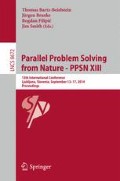Abstract
The fitness-level technique is a simple and old way to derive upper bounds for the expected runtime of simple elitist evolutionary algorithms (EAs). Recently, the technique has been adapted to deduce the runtime of algorithms with non-elitist populations and unary variation operators [2,8]. In this paper, we show that the restriction to unary variation operators can be removed. This gives rise to a much more general analytical tool which is applicable to a wide range of search processes. As introductory examples, we provide simple runtime analyses of many variants of the Genetic Algorithm on well-known benchmark functions, such as OneMax, LeadingOnes, and the sorting problem.
Access this chapter
Tax calculation will be finalised at checkout
Purchases are for personal use only
Preview
Unable to display preview. Download preview PDF.
References
Chen, T., Lehre, P., Tang, K., Yao, X.: When is an estimation of distribution algorithm better than an evolutionary algorithm? In: Proceedings of IEEE Congress on Evolutionary Computation (CEC 2009), pp. 1470–1477 (2009)
Dang, D.C., Lehre, P.K.: Refined upper bounds on the expected runtime of non-elitist populations from fitness levels. In: Proceedings of Genetic and Evolutionary Computation Conference (GECCO 2014) (to appear, 2014)
Doerr, B., Doerr, C., Ebel, F.: Lessons from the black-box: Fast crossover-based genetic algorithms. In: Proceedings of the Genetic and Evolutionary Computation Conference (GECCO 2013), pp. 781–788 (2013)
Dubhashi, D., Panconesi, A.: Concentration of Measure for the Analysis of Randomized Algorithms. Cambridge University Press, NY (2009)
Eremeev, A.V.: Modeling and analysis of genetic algorithm with tournament selection. In: Fonlupt, C., Hao, J.-K., Lutton, E., Schoenauer, M., Ronald, E. (eds.) AE 1999. LNCS, vol. 1829, pp. 84–95. Springer, Heidelberg (2000)
Goldberg, D.E.: Genetic Algorithms in search, optimization and machine learning. Addison-Wesley, MA (1989)
He, J., Yao, X.: Drift analysis and average time complexity of evolutionary algorithms. Artificial Intelligence 127(1), 57–85 (2001)
Lehre, P.K.: Fitness-levels for non-elitist populations. In: Proceedings of Genetic and Evolutionary Computation Conference (GECCO 2011), pp. 2075–2082 (2011)
Lehre, P.K.: Negative drift in populations. In: Schaefer, R., Cotta, C., Kołodziej, J., Rudolph, G. (eds.) PPSN XI. LNCS, vol. 6238, pp. 244–253. Springer, Heidelberg (2010)
Lehre, P.K., Yao, X.: Crossover can be constructive when computing unique input-output sequences. Soft Computing 15(9), 1675–1687 (2011)
Lehre, P.K., Yao, X.: On the impact of mutation-selection balance on the runtime of evolutionary algorithms. IEEE Transactions on Evolutionary Computation 16(2), 225–241 (2012)
Oliveto, P.S., Witt, C.: Improved runtime analysis of the simple genetic algorithm. In: Proceedings of the Genetic and Evolutionary Computation Conference (GECCO 2013), pp. 1621–1628 (2013)
Qian, C., Yu, Y., Zhou, Z.H.: An analysis on recombination in multi-objective evolutionary optimization. Artificial Intelligence 204, 99–119 (2013)
Scharnow, J., Tinnefeld, K., Wegener, I.: The analysis of evolutionary algorithms on sorting and shortest paths problems. Journal of Mathematical Modelling and Algorithms 3(4), 349–366 (2004)
Sudholt, D.: Crossover speeds up building-block assembly. In: Proceedings of Genetic and Evolutionary Computation Conference (GECCO 2012), pp. 689–702 (2012)
Sudholt, D.: A new method for lower bounds on the running time of evolutionary algorithms. IEEE Transactions on Evolutionary Computation 17(3), 418–435 (2013)
Vose, M.D.: The Simple Genetic Algorithm: Foundations and Theory. MIT Press, Cambridge (1999)
Wegener, I.: Methods for the analysis of evolutionary algorithms on pseudo-boolean functions. Evolutionary Optimization 48, 349–369 (2002)
Witt, C.: Runtime analysis of the (μ+1) EA on simple pseudo-boolean functions. Evolutionary Computation 14(1), 65–86 (2006)
Author information
Authors and Affiliations
Editor information
Editors and Affiliations
Rights and permissions
Copyright information
© 2014 Springer International Publishing Switzerland
About this paper
Cite this paper
Corus, D., Dang, DC., Eremeev, A.V., Lehre, P.K. (2014). Level-Based Analysis of Genetic Algorithms and Other Search Processes. In: Bartz-Beielstein, T., Branke, J., Filipič, B., Smith, J. (eds) Parallel Problem Solving from Nature – PPSN XIII. PPSN 2014. Lecture Notes in Computer Science, vol 8672. Springer, Cham. https://doi.org/10.1007/978-3-319-10762-2_90
Download citation
DOI: https://doi.org/10.1007/978-3-319-10762-2_90
Publisher Name: Springer, Cham
Print ISBN: 978-3-319-10761-5
Online ISBN: 978-3-319-10762-2
eBook Packages: Computer ScienceComputer Science (R0)

